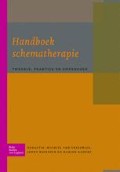Samenvatting
‘Meten is weten’ en ‘kennis is macht’ zijn uitspraken die iedereen wel kent. In het psychotherapeutische veld zijn deze zinnen vooral voorbehouden aan onderzoekers die een wetenschappelijke publicatie willen schrijven over effectiviteit van therapie of aan diagnostici die de problematiek van een patiënt in kaart willen brengen. Maar wat heeft de patiënt nu zelf aan ‘meten is weten’? Kan therapieresultaat toenemen wanneer aan de patiënt feedback wordt gegeven over zijn behandelbeloop zoals gemeten met enkele vooraf vastgestelde meetinstrumenten? Is feedback geven aan therapeuten over therapievordering zinvol?
Access this chapter
Tax calculation will be finalised at checkout
Purchases are for personal use only
Literatuur
Bateman, A., & Fonagy, P. (2004). Psychotherapy for borderline personality disorder. Mentalization-based treatment. New York: Oxford University Press.
Beck, A.T., Freeman, A., & Davis, D.D. (2004). Cognitive therapy of personality disorders (second edition). New York: The Guilford Press.
Beurs, E. de (2005). Routine Outcome Monitoring in het LUMC en Rivierduinen. http://www.lumc.nl/3010/algemeen/Routine%20Monitoring.pdf.
Haas, E., Hill, R.D., Lambert, M.J., & Morrell, B. (2002). Do early responders to psychotherapy maintain treatment gains? Journal of Clinical Psychology, 58, 1157–1172.
Hannan, C., Lambert, M.J., Harmon, C., Nielsen, S.L., Smart, D.W., Shimokawa, K., & Stutton, S.W. (2005). A lab test and algorithms for identifying clients at risk for treatment failure. Journal of Clinical Psychology, 61, 155–163.
Hansen, N.B., Lambert, M.J., & Forman, E.V. (2002). The psychotherapy dose-effect and its implications for treatment delivery services. Clinical Psychology: Science and Practice, 9, 329 –343.
Harmon, C., Hawkins, E.J., Lambert, M.J., Slade, K., & Whipple, J.L. (2005). Improving outcomes for poorly responding clients: the use of clinical support tools and feedback to clients. Journal of Clinical Psychology, 61, 175–185.
Hoffart, A., Sexton, H., Nordahl, H.M., & Stiles, T.C. (2005). Connection between patient and therapist and therapist’s competence in schema-focused therapy of personality problems. Clinical Psychology & Psychotherapy, 3, 249–258.
Lambert, M.J. (2005). Emerging methods for providing clinicians with timely feedback on treatment effectiveness: An introduction. Journal of Clinical Psychology, 61, 141–144.
Lambert, M.J. (2007). Persoonlijke correspondentie.
Lambert, M.J., Burlingame, G.M., Umphress, V., Hansen, N.B., Vermeersch, D.A., Clouse, G.C., & Yanchar, S.C. (1996). The reliability and validity of the outcome questionnaire. Clinical Psychology & Psychotherapy, 3, 249–258.
Lambert, M.J., Hansen, N.B., & Bauer, S. (in druk). Assessing the clinical significance of outcome results. In: A. Nezu & C. Nezu, Evidence-based outcome research. New York: Oxford Press.
Lambert, M.J., & Ogles, B.M. (2004). The efficacy and effectiveness of psychotherapy. In: M.J. Lambert (Ed.), Bergin and Garfield’s handbook of psychotherapy and behavioural change (fifth edition) (p. 139–193). New York: Wiley.
Lambert, M.J., Whipple, J.L., Smart, D.W., Vermeersch, D.A., Nielsen, S.L., & Hawkins, E.J. (2001). The effects of providing therapist with feedback on client progress during psychotherapy: Are outcomes enhanced? Psychotherapy Research, 11, 49–68.
Lambert, M.J., Whipple, J.L., Vermeersch, D.A., Smart, D.W., Hawkins, E.J., Nielsen, S.L., & Goates, M. (2002). Enhancing psychotherapy outcomes via providing feedback on client progress; A replication. Clinical Psychology and Psychotherapy, 9, 91–103.
Leichsenring, F., & Leibing, E. (2003). The effectiveness of psychodynamic therapy and cognitive behavior therapy in the treatment of personality disorders: A meta-analysis. American Journal of Psychiatry, 160, 1223–1232.
Lobbestael, J., Vreeswijk, M.F., Arntz, A., & Spinhoven, Ph. (aangeboden voor publicatie). Reliability and validity of the Schema Mode Inventory (SMI).
Martin, D.J., Garske, J.P., & Davis, M.K. (2000). Relation of the therapeutic alliance with outcome and other variables: A meta-analytical review. Journal of Consulting and Clinical Psychology, 68, 438–450.
Norcross, J.C. (2003). Empirically supported therapy relationships. In: J.C. Norcross (Ed.), Psychotherapy relationships that work (p. 3–16). New York: Oxford University Press.
Orlinsky, D.E., Ronnestad, M.H., & Willutzki, U. (2004). Fifty years of psychotherapy process-outcome research: Continuity and change. In: M.J. Lambert (Ed.), Bergin and Garfield’s handbook of psychotherapy and behavioral change (fifth edition) (p. 307–390). New York: Wiley.
Perry, J.C., Banon, E., & Ianni, F. (1999). Effectiveness of psychotherapy for personality disorders. American Journal of Psychiatry, 156, 1312–1321.
Percevic, R., Lambert, M.J., & Kordy, H. (2006). What is the predictive value of responses to psychotherapy for its future course? Empirical explorations and consequences for outcome monitoring. Psychotherapy Research, 16, 364–373.
Strauss, J.L., Hayes, A.M., Johnson, S.L., Newman, C.F., Brown, G.K., Barber, J.P., Laurenceau, J., & Beck, A.T. (2006). Early alliance, alliance ruptures, and symptom change in a nonrandomized trial of cognitive therapy for avoidant and obsessive-compulsive personality disorders. Journal of Consulting and Clinical Psychology, 74, 337–345.
Spinhoven, Ph., Giesen-Bloo, J., Dyck, R. van, Kooiman, K., & Arntz, A. (2007). The therapeutic alliance in schema-focused therapy and transference-focused psychotherapy for borderline personality disorder. Journal of Consulting and Clinical Psychology, 75, 104–115.
Sterk, F., & Rijkeboer, M.M. (1997). Schema-Vragenlijst. Utrecht: Ambulatorium Universiteit Utrecht.
Waddington, L. (2002). The therapy relationship in cognitive therapy: A review. Behavioural and Cognitive Psychotherapy, 30, 179–191.
Werkgroep richtlijn persoonlijkheidsstoornissen (2008). Multidisciplinaire richtlijn Persoonlijkheidsstoornissen. Richtlijn voor de diagnostiek en behandeling van volwassen patiënten met een persoonlijkheidsstoornis (conceptversie). Utrecht: Trimbos-instituut.
Young, J.E., Klosko, J., & Weishaar, M.E. (2003). Schema therapy: A practitioner’s guide. New York: The Guilford Press.
Young, J., Arntz, A., Atkinson, T., Lobbestael, J., Weishaar, M., Vreeswijk, M.F. van, & Klokman, J. (2007). Schema Mode Inventory (SMI version 1). New York: Schema Therapy Institute.
Website
Trimbos-instituut (2003). Nieuwe ‘thermometers’ voor cliëntwaardering ggz. www.trimbos.nl/default4103.html
Editor information
Rights and permissions
Copyright information
© 2008 Bohn Stafleu van Loghum, onderdeel van Springer Uitgeverij
About this chapter
Cite this chapter
van Vreeswijk, M., Broersen, J., Spinhoven, P. (2008). 17 Effect van meten is weten: therapieresultaten en therapeutische relatie. In: van Vreeswijk, M., Broersen, J., Nadort, M. (eds) Handboek schematherapie. Bohn Stafleu van Loghum, Houten. https://doi.org/10.1007/978-90-313-6628-6_17
Download citation
DOI: https://doi.org/10.1007/978-90-313-6628-6_17
Publisher Name: Bohn Stafleu van Loghum, Houten
Print ISBN: 978-90-313-5304-0
Online ISBN: 978-90-313-6628-6
eBook Packages: Dutch language eBook collection

